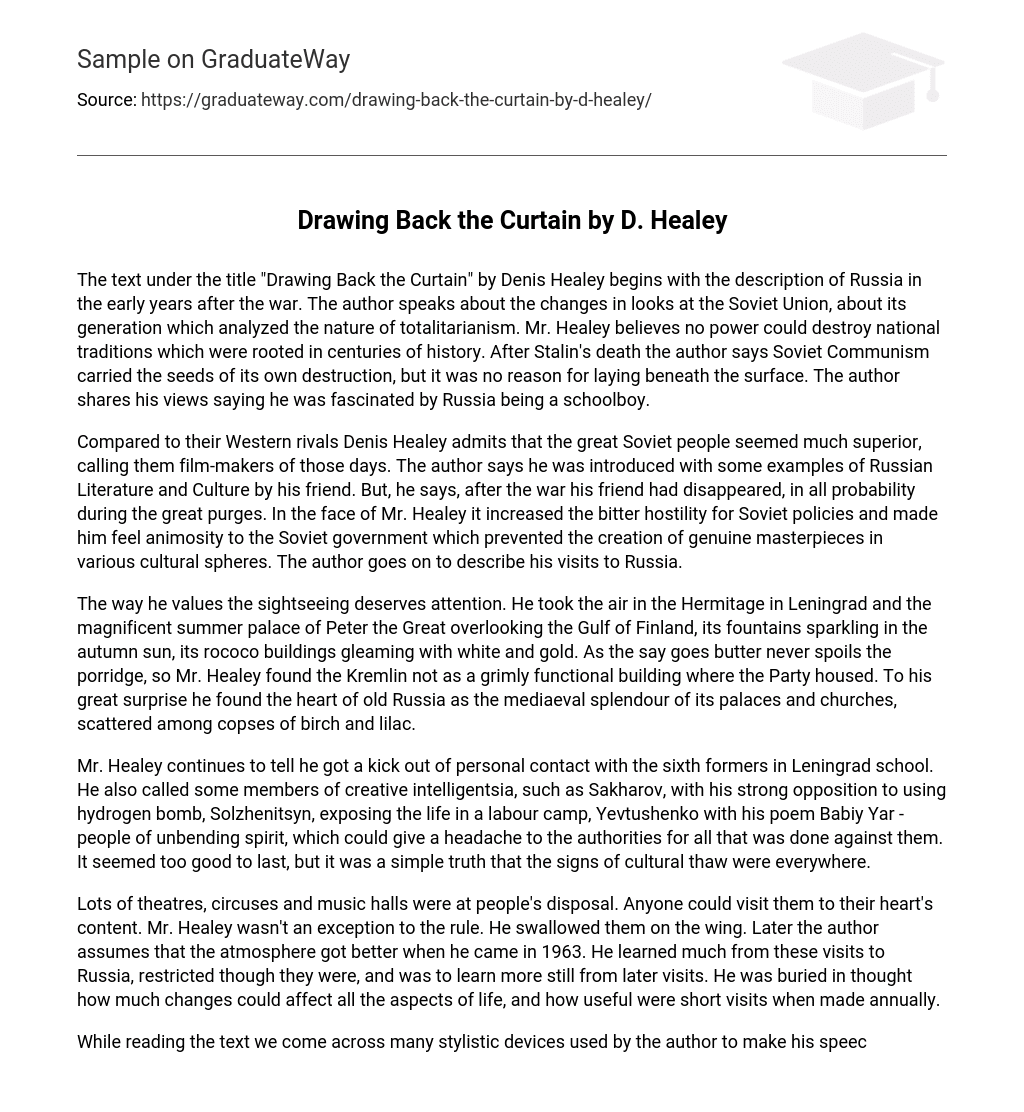In the text “Drawing Back the Curtain” by Denis Healey, he discusses the post-war years in Russia and how the Soviet Union’s appearance changed. The author also mentions a generation in Russia that examined totalitarianism. Healey believes that deep-rooted national traditions cannot be destroyed by any power, despite the fact that Soviet Communism had flaws leading to its eventual downfall. Despite this, he insists that these flaws should not be ignored. He also reveals his personal fascination with Russia during his school years.
Denis Healey concedes that the remarkable Soviet people appeared significantly superior compared to their Western counterparts, referring to them as the filmmakers of that era. The narrator acknowledges being acquainted with instances of Russian literature and culture through a friend. However, they express that their friend disappeared after the war, likely falling victim to the great purges. This event further intensified Mr. Healey’s strong animosity towards Soviet policies and government, as it hindered the development of true masterpieces in diverse cultural domains. The author proceeds to recount their visits to Russia.
The way he values the sightseeing deserves attention. He took the air in the Hermitage in Leningrad and the magnificent summer palace of Peter the Great overlooking the Gulf of Finland, its fountains sparkling in the autumn sun, its rococo buildings gleaming with white and gold. As the say goes butter never spoils the porridge, so Mr. Healey found the Kremlin not as a grimly functional building where the Party housed. To his great surprise he found the heart of old Russia as the mediaeval splendour of its palaces and churches, scattered among copses of birch and lilac.
Mr. Healey expressed his enjoyment of interacting with the sixth formers in a Leningrad school. He also mentioned individuals from the creative intelligentsia, including Sakharov, who vehemently opposed the use of hydrogen bombs, Solzhenitsyn, who revealed the harsh reality of life in a labor camp, and Yevtushenko, known for his powerful poem Babiy Yar. These individuals showcased an unwavering spirit that posed challenges to the authorities despite the repercussions they faced. Mr. Healey acknowledged that while it may not last, it was undeniable that signs of cultural progress were evident everywhere.
Many theatres, circuses, and music halls were available for people to enjoy. They were open for anyone to visit and experience to their liking. Mr. Healey was no exception to this. He eagerly took advantage of these opportunities. The author later suggests that the atmosphere improved when he visited in 1963. Despite the limitations on his visits to Russia, he gained valuable knowledge from them and continued to learn more from subsequent visits. He pondered how much changes could impact all areas of life and acknowledged the benefits of short annual visits.
While reading the text, we encounter various stylistic devices employed by the author to enhance the emotive quality of his speech. An excellent instance of this is evident in sentences like: “I had been fascinated by Russia…” and “I was impressed by pre-war Soviet culture…”, which reflect Mr. Healey’s tender disposition towards everything associated with our homeland. Additionally, numerous metaphors are employed, such as: “The Russia of Tolstoy, Tchaikovsky, and Herzen…”, indicating that Russia is not merely a simple country but rather the motherland of many exceptional individuals. The phrase “No power could destroy its national traditions…” further reinforces this idea.
The author establishes that eradicating all the longstanding habits and traditions ingrained in people’s minds is an unattainable task. These elements, accumulated over centuries, have become a source of concern for the authorities governing our country. Mr. Healey employs epithets such as “errate illusions,” “the bitter hostility,” “remarkable purity,” “grimly functional building,” and “hair-raising obscenity” to showcase his creative range and the expressive power of his language.
The text provides examples of contrast to emphasize the importance of not focusing on ordinary things and recognizing the differences. Instead of viewing something as a tragedy with humor, it suggests seeing it as a sad comedy. Similarly, rather than perceiving someone as a wrinkled cynic, it suggests seeing them as a handsome vigorous young prophet of a better future. The author’s use of inverted commas around “Kompository Verdi” and “Socialist Realism” highlights their interest in the Russian Language and the significance of understandable words, likely for the international community. The text also employs hyperbole, such as describing something as a “like hurricane” and a “library of sense – impressions”. Ultimately, the main message conveyed by Mr. Healey is that while people have both similarities and differences, each race is extraordinary.





